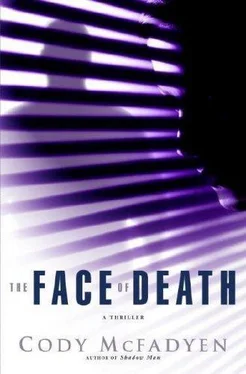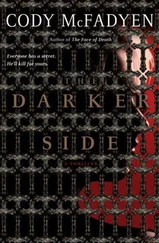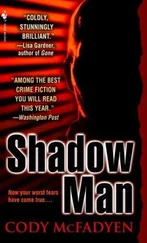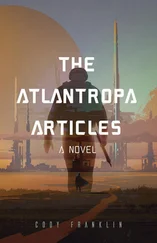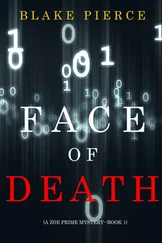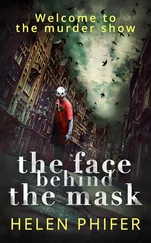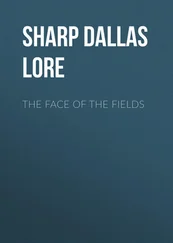"Thank God we still have daylight," Callie remarks, looking up at the helicopter. "I can't stand those blinding spotlights."
People are everywhere. The braver ones are standing on their lawns, while the more timid peek out from behind window curtains. It's funny, I think. People talk about crime in urban areas, but all the best murders happen in the suburbs.
Callie parks the car on the side of the street.
"Ready?" I ask her.
"Born ready, bring it on, pick your cliche," she says. As we exit the car, I see Callie grimace. She places a hand on the roof of the car to steady herself.
"Are you all right?" I ask.
She waves away my concern. "Residual pain from getting shot, nothing I can't handle." She reaches into a jacket pocket and pulls out a prescription bottle. "Vicodin, today's mother's little helper." She pops the top and palms a tablet. Downs it. Smiles. "Yummy."
Callie had been shot six months ago. The bullet had nicked her spine. For one very tense week we weren't sure she was going to walk again. I thought she'd recovered fully.
Guess I was wrong.
Wrong? She carries her Vicodin around with her like a box of Tic Tacs!
"Let's see what all the shouting is about, shall we?" she asks.
"Yep," I reply.
But don't think I'm going to let this go, Callie. We head over to the perimeter. A twentysomething patrolman stops us. He's a good-looking kid. I can sense his excitement at being a part of this law-enforcement cacophony. I like him right away; he sees the scars on my face and almost doesn't flinch.
"Sorry, ma'am," he says. "I can't let anyone in right now."
I fish out my FBI ID and show it to him. "Special Agent Barrett," I say. Callie does the same.
"Sorry, ma'am," he says again. "And, ma'am," he says to Callie.
"Don't sweat it," Callie replies.
I spot Alan standing in a cluster of suits and uniforms. He towers above them all, an imposing edifice of a human being. Alan is in his mid-forties, an African-American man who can only be described as gargantuan . He's not obese--just big. His scowl can make an interrogation room seem like a small and dangerous place for a guilty man. Life loves irony, and Alan is no exception. For all his size, he is a thoughtful man-mountain, a brilliant mind in a linebacker's body. He combines meticulous precision with near-infinite patience. His attention to detail is legendary. One of the best testaments to his character is the fact that Elaina is his wife, and she adores him. Alan is the third member of my four-person team, the oldest and most grounded. He told me when Elaina had been diagnosed with cancer that he was considering leaving the FBI so that he could spend more time with her. He hasn't brought it up since, and I haven't pushed him on it, but I am never really unaware of it. Callie popping pills, Alan thinking of retiring--maybe I should leave. Let them rebuild the team from scratch.
"There she is," I hear Alan say.
I start to catalogue the various reactions to my face and then let it go. Take it or leave it, boys.
One of the men steps forward, putting a hand out to shake mine. The other hand, I note, grips an MP5 submachine gun. He's dressed in full SWAT regalia--body armor, helmet, boots. "Luke Dawes," he says.
"SWAT commander. Thanks for coming."
"No problem," I reply. I point to Alan. "Do you mind if I have my guy fill me in? No offense intended."
"None taken."
I turn to Alan and push aside all my own internal chatter, letting the simplicity of action and command take over. "Hit me," I say.
"A call came into 911 about an hour and a half ago from the next door neighbor. Widower by the name of Jenkins. Jenkins says that the girl--Sarah Kingsley--had stumbled into his front yard, dressed in a nightgown, covered in blood."
"How did he know she was in the front yard?"
"His living room is in the front of the house and he keeps his drapes open until he goes to bed. He was watching TV, saw her out of the corner of his eye."
"Go on."
"He's shook, but he musters up enough courage to go out and see what the problem is. Said she was unfocused--his word--and mumbling something about her family being murdered. He tries to get her to come into his house, but she screams and runs off, reenters her own home."
"I take it he was wise enough not to follow her?"
"Yeah, the heroics only went as far as his own front yard. He ran back inside, made the call. A patrol car happens to be nearby, so they come over to check it out. The officers"--he checks his notepad again--"Sims and Butler, arrive, poke their heads in the front door--which was wide open--and try to get her to come back out. She's unresponsive. After talking it over, they decide to go in and get her. Dangerous maybe, but neither of them are rookies, and they're worried about the girl."
"Understandable," I murmur. "Are Sims and Butler still here?"
"Yep."
"Go on."
"They enter the home and it's a fucking bloodbath from the get-go."
"Have you been inside?" I interrupt.
"No. No one's been in there since she got hold of a weapon. So they go in, and it's obvious that something bad happened, and that it happened recently. Lucky for us, Sims and Butler have dealt with murder scenes before, so they don't lose their heads. They give anything that looks like evidence a wide berth."
"Good," I say.
"Yeah. They hear noise on the second floor, and call out for the girl. No answer. They proceed up the stairs, and find her in the master bedroom, along with three dead bodies. She's got a gun." He consults his notes. "A nine mm of some kind, per the officers. Things change fast at that point. Now they're nervous. They're thinking maybe she's responsible for whatever happened here, and they point their weapons at her, tell her to drop the gun, etc., etc. That's when she puts it to her own head."
"And things change again."
"Right. She's crying, and starts screaming at them. Saying, quote,
'I want to talk to Smoky Barrett or I'll kill myself!' End quote. They try to talk her down, but give it up after she points the gun at them a few times. They call it in and"--he opens his arms to indicate the overwhelming presence of law enforcement around us--"here we are." He nods his head toward the SWAT commander. "Lieutenant Dawes knew your name and got someone to get ahold of me. I came here, checked things out, called you."
I turn to Dawes, study him. I see a fit, alert, hard-eyed professional policeman with calm hands and brunet hair in a crew cut. He's on the short side, about five-nine, but he's lean and coiled and ready. He radiates calm confidence. He's a SWAT stereotype, something I always find comforting whenever I encounter it. "What do you think, Lieutenant?"
He studies me for a few seconds. Then shrugs. "She's sixteen, ma'am. A gun's a gun, but . . ." He shrugs again. "She's sixteen."
She's too young to die, he's saying. Definitely too young for me to kill with- out it ruining my day.
"Do you have a negotiator on-site?" I ask.
I'm asking about a hostage negotiator. Someone trained in talking to unbalanced people carrying guns. Negotiator is a bit of a misnomer, actually; they usually operate in three-man teams.
"Nope," Dawes replies. "We currently have three negotiating teams in LA. Some guy decided today was the day he was going to jump off the top of the Roosevelt Hotel in Hollywood--that's one. There's a dad about to lose custody of his kids who decided to put a shotgun to his head--that's two. The last team got T-boned in an intersection this morning on their way to a training seminar, if you can believe that."
He shakes his head in disgust. "It was a truck that hit them. They'll live, but they're all in the hospital. We're on our own." He pauses. "I could handle this all kinds of ways, Agent Barrett. Tear gas, nonlethal ammo. But tear gas is going to fuck up what sounds like a murder scene. And nonlethal ammo, well . . . she could still shoot herself even after getting hit with a beanbag." He smiles without humor. "Seems like the best plan involves you going in there and talking to a crazy teenager holding a gun."
Читать дальше
